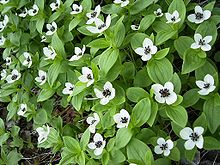| Cornaceae | |
|---|---|

| |
| Cornus suecica | |
| Scientific classification | |
| Kingdom: | Plantae |
| Clade: | Tracheophytes |
| Clade: | Angiosperms |
| Clade: | Eudicots |
| Clade: | Asterids |
| Order: | Cornales |
| Family: | Cornaceae Bercht. & J.Presl |
| Genera | |
The Cornaceae are a cosmopolitan family of flowering plants in the order Cornales. The family contains approximately 85 species in two genera,[1] Alangium and Cornus. They are mostly trees and shrubs, which may be deciduous or evergreen, although a few species are perennial herbs. Members of the family usually have opposite or alternate simple leaves, four- or five-parted flowers clustered in inflorescences or pseudanthia, and drupaceous fruits.[2] The family is primarily distributed in northern temperate regions and tropical Asia.[3] In northern temperate areas, Cornaceae are well known from the dogwoods Cornus.
The systematics of Cornaceae has been remarkably unsettled and controversial, and many genera have been added to it and removed from it over time. (One researcher called it a "dustbin".[4]) Molecular phylogenetics have clarified the relatedness of some associated genera, and at least nine genera that were previously included in Cornaceae have been eliminated from the order Cornales entirely,[5] but the circumscription of Cornaceae is still unclear. The Angiosperm Phylogeny Group usually defines Cornaceae as comprising the genera Cornus and Alangium as well as five genera now separated into the family Nyssaceae. However, many of these genera are sometimes split off into their own families (e.g. Alangiaceae), and the usage remains inconsistent.[5][6]
- ^ Christenhusz, M. J. M. & Byng, J. W. (2016). "The number of known plants species in the world and its annual increase". Phytotaxa. 261 (3). Magnolia Press: 201–217. doi:10.11646/phytotaxa.261.3.1.
- ^ Kubitzki, K. (2004). Cornaceae. In The Families and Genera of Vascular Plants Volume 6: Flowering Plants: Dicotyledons: Celastrales, Oxidales, Rosales, Cornales, Ericales (Kubitzki, ed.). Springer-Verlag, New York.
- ^ Heywood, V.H.; Brummitt, R.K.; Culham, A.; Seberg; O. (2007). Flowering Plant Families of the World. Buffalo, New York: Firefly Books. p. 112. ISBN 9781842461655.
- ^ Eyde, R. H. (1988). Comprehending Cornus - puzzles and progress in the systematics of the dogwoods. Botanical Review 54, 233-351.
- ^ a b Fan, C. Z., and Xiang, Q. Y. (2003). Phylogenetic analyses of Cornales based on 26S rRNA and combined 26S rDNA-matK-rbcL sequence data. American Journal of Botany 90, 1357-1372.
- ^ Angiosperm Phylogeny Group (2009). "An update of the Angiosperm Phylogeny Group classification for the orders and families of flowering plants: APG III". Botanical Journal of the Linnean Society. 161 (2): 105–121. doi:10.1111/j.1095-8339.2009.00996.x. hdl:10654/18083.